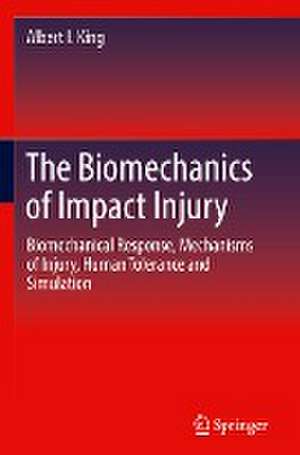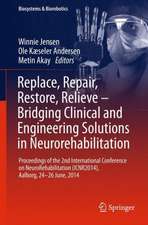The Biomechanics of Impact Injury: Biomechanical Response, Mechanisms of Injury, Human Tolerance and Simulation
Autor Albert I. Kingen Limba Engleză Hardback – 8 aug 2017
| Toate formatele și edițiile | Preț | Express |
|---|---|---|
| Paperback (1) | 1441.69 lei 38-44 zile | |
| Springer International Publishing – 3 aug 2018 | 1441.69 lei 38-44 zile | |
| Hardback (1) | 964.43 lei 17-23 zile | +82.93 lei 6-12 zile |
| Springer International Publishing – 8 aug 2017 | 964.43 lei 17-23 zile | +82.93 lei 6-12 zile |
Preț: 964.43 lei
Preț vechi: 1015.18 lei
-5% Nou
Puncte Express: 1447
Preț estimativ în valută:
184.58€ • 192.19$ • 155.99£
184.58€ • 192.19$ • 155.99£
Carte disponibilă
Livrare economică 12-18 februarie
Livrare express 01-07 februarie pentru 92.92 lei
Preluare comenzi: 021 569.72.76
Specificații
ISBN-13: 9783319497907
ISBN-10: 3319497901
Pagini: 260
Ilustrații: LVI, 662 p. 526 illus., 249 illus. in color.
Dimensiuni: 155 x 235 x 41 mm
Greutate: 1.36 kg
Ediția:1st ed. 2018
Editura: Springer International Publishing
Colecția Springer
Locul publicării:Cham, Switzerland
ISBN-10: 3319497901
Pagini: 260
Ilustrații: LVI, 662 p. 526 illus., 249 illus. in color.
Dimensiuni: 155 x 235 x 41 mm
Greutate: 1.36 kg
Ediția:1st ed. 2018
Editura: Springer International Publishing
Colecția Springer
Locul publicării:Cham, Switzerland
Cuprins
Chapter1. Introduction.- Chapter2. Basics of the Biomechanics of Brain Injury.- Chapter3. Basics of the Biomechanics of Brain Injury.- Chapter4. Basics of the Biomechanics of Brain Injury.- Chapter5.Basics of the Biomechanics of Brain Injury.- Chapter6. Basics of the Biomechanics of Brain Injury.- Chapter7.Basics of the Biomechanics of Brain Injury.- Chapter8.Basics of the Biomechanics of Brain Injury.- Chapter9.Basics of the Biomechanics of Brain Injury.- Chapter10.Biomechanics of Facet Loading on the Lumbar Spine.- Chapter11.Biomechanics of Facet Loading on the Lumbar Spine.- Chapter12. Impact Biomechanics of the Abdomen.- Chapter13.Impact Biomechanics of the Abdomen.- Chapter14.Impact Biomechanics of the Lower Extremities.- Chapter15. Impact Biomechanics of the Foot.- Chapter16.Side Impact.- Chapter17.Side Impact.- Chapter18.Biomechanics of Automotive Safety Restraints.- Chapter19. Biomechanics of Sports Injuries.- Chapter20. Epilog.
Recenzii
“This is a broad survey featuring engineering mechanics and the relationship of this discipline to blunt trauma. … This book is most appropriate for mechanical engineers or those in other engineering disciplines. Trauma surgeons, neurosurgeons, and orthopedic surgeons may also be interested in this book.” (David J. Dries, Doody's Book Reviews, November, 2017)
Notă biografică
Albert I. King, PhD is a Distinguished Professor of Biomedical Engineering at Wayne State University and is widely known for his contributions to the field of impact biomechanics. He has studied injury mechanisms from head to toe, including the brain, neck, thoracolumbar spine, pelvis, knee, ankle and foot. He developed computer models to simulate the effect of impact on the human body and is a strong proponent of using computer models for automotive safety design to reduce the cost of new car design. He believes that injury mechanisms need to be understood because It is better to prevent an injury than to treat it. However, injuries cannot be prevented unless we know the cause. Dr. King was the first engineer in impact biomechanics to be elected to the National Academy of Engineering in 2000. He received many other awards, including the Smithsonian Medal in 1998 and the Kappa Delta Award from the American Academy of Orthopedic Surgeons in 1995.
Textul de pe ultima copertă
This text acquaints the reader on the biomechanics of injury to the human body caused by impact and the use of computer models to simulate impact events. It provides a basic understanding of the biomechanics of the injuries resulting from the impact to the head, neck, chest, abdomen, spine, pelvis and the lower extremities, including the foot and ankle. Other topics include side impact, car-pedestrian impact, effectiveness of automotive restraint systems and sports-related injuries. Featuring problems and PowerPoint slides for lectures, the volume is ideal for students in graduate programs in biomechanics, as well as practicing engineers, and researchers in the life sciences concerned with orthopedics.
Caracteristici
Provides a comprehensive treatment of the biomechanics of injury, facilitating a basic understanding of the subject for students as well as an authoritative reference for practitioners Explains biomechanics of response to impact, tolerance to impact, and methods and techniques used to develop computer models that simulate an impact event Emphasizes automobile-related injuries as well as those sustained in contact sports Reinforces reader understanding of computer models simulating blunt impact to the entire body Includes computational problems and lecture slides Includes supplementary material: sn.pub/extras


















